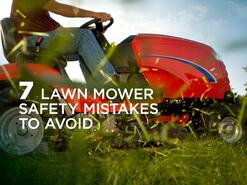Mowing grass is such a common activity that business managers may not realize it’s a skill workers need to be properly trained on before using company equipment. If your business falls into this category, just remember that Occupational Safety and Health Administration (OSHA) also views lawn care as a work activity requiring workers to have proper training, safe equipment and the necessary personal protection equipment (PPE).
Because of the false assumption that all workers have the knowledge and skills to operate a mower safely, managers may assign anyone available to perform a mowing task. The supervisor may not take the time to verify that the worker knows the operation and safety precautions for the equipment they’ll use for the job.
And employees often do not stop to ask questions because they assume they know enough to handle the machine and the task. It’s also possible employees are afraid to admit they have doubts about their ability to handle the machine.
Safe Mowing Basics
In addition to proper training, safe operation of a mower consists of making sure the equipment is maintained and safe to use. Both components are necessary for a strong safety program.
Keep equipment in tip-top shape. This includes adhering to a maintenance schedule following all manufacturer’s instructions and ensuring that the roll over protection system (ROPS), guards, seat belts and shields are in place and secure.
Train all operators on the equipment and safety rules. This encompasses knowing how to handle the equipment and understanding safety features. But it also covers the basics of safe mowing (speed, inclines, stability, checking for hazards before starting the machine, etc.), proper apparel (a tight fit so nothing can be caught in the equipment) and PPE (heavy boots, safety goggles and hearing protection). Find more information and illustrations of proper and improper techniques in Mowing and Trimming Safely, an OSHA manual.
Common Mistakes to Avoid
Check to be sure these mistakes aren’t popping up in your landscape:
- Mowing slopes the wrong way. When using a riding mower, it is safer to go up and down hills than across slopes. The opposite is true when using a walk-behind mower.
- Overriding safety mechanisms. Protections are in place and it’s not smart to disable the blade or disengage or discharge any other safety components.
- Becoming lax on maintenance. Keep records of when and how the equipment is supposed to be cared for and document when the work is completed.
- Underestimating equipment such as zero-turn mowers. It’s surprising how quickly these mowers zip along. Training and practice are important, especially for employees who have not worked with similar equipment in the past.
- Failing to survey the area. Employees may know the area’s topography, but new sticks and other impediments may have popped up. Be sure employees are checking prior to and while mowing.
- Skipping full PPE. Some mowers are quite loud so hearing protection is needed to prevent hearing loss. Eye protection is a critical component as an employee could hit a sharp stick or stone that can ricochet into an eye. Additionally, tree branches may swing into an employee’s face and cause an eye injury.
- Incorrectly loading lawn care equipment. When moving landscape-care equipment in a truck from one job site to another, it’s important that mowers, weed eaters, rakes and other equipment are properly secured. You don’t want items to be damaged or to fly out of the vehicle during transport.


 RSS Feed
RSS Feed
